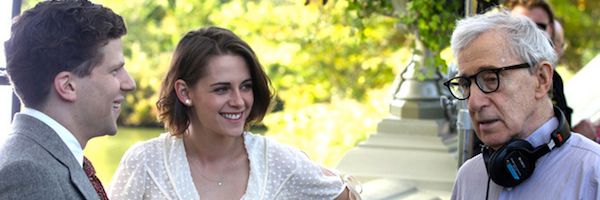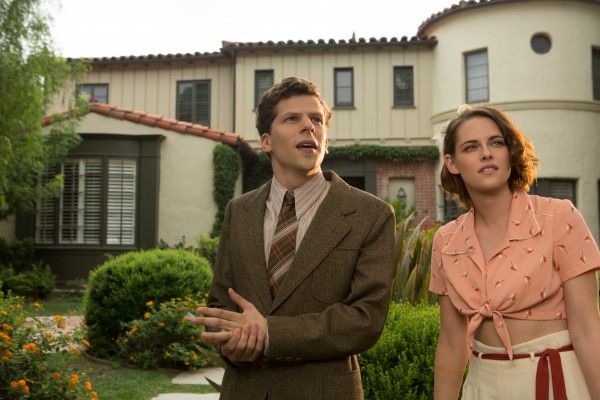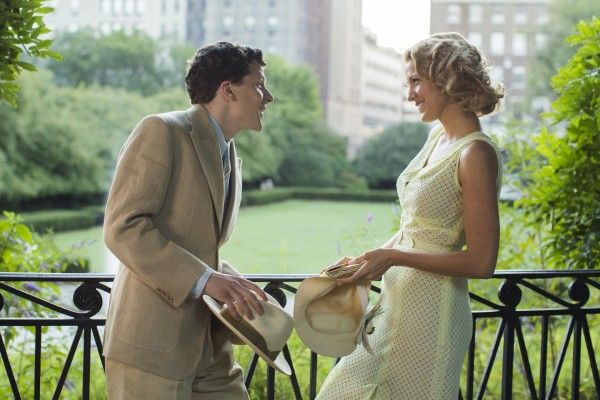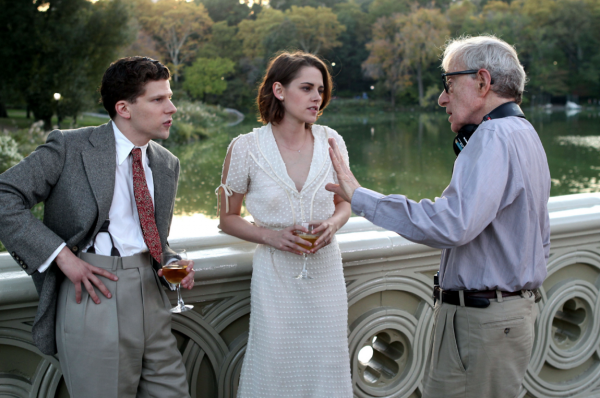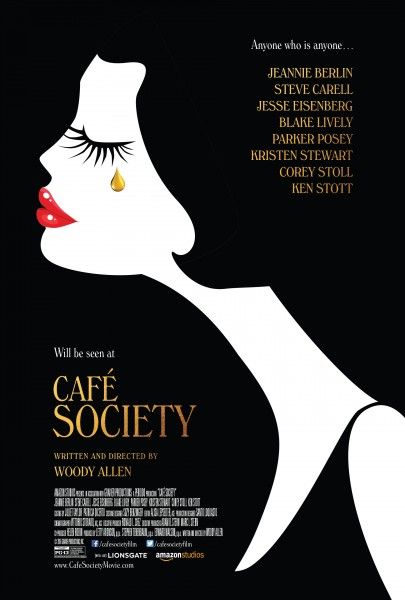With 16 Best Original Screenplay nominations and three wins, Woody Allen is the most Oscar-nominated screenwriter of all time (his last win was for 2011's Midnight in Paris). His personal acclaim is perhaps matched only by his personal history. As the filmmaker has been making films at a once-a-year click since 1969 (only missing a yearly film here and there) the steady stream of films has not only provided yearly entertainment, but also a yearly heap of think pieces on the sexual abuse allegation against Allen.
While attending the press day for Allen's newest, Café Society, I spoke with his two trusted producers, his sister Letty Aronson and his friend Edward Walson. We mostly talked about their working history with Allen and Allen's seamless transition to digital (Society is perhaps his most lush looking film yet) but I also wanted to ask how they would like to convince people that it might be okay to watch a Woody Allen film (now) if you feel revolted about the allegation. Whether or not their answer appeases you, it was at least answered. I enjoyed his new film but I do feel some qualms about recommending his new work (aside from writing a positive review for Society). Ultimately, it's up to each individual.
Letty, you’ve produced every Woody Allen film since 1994's Bullets Over Broadway. How has his process changed from decade to decade?
LETTY ARONSON: He hasn’t really changed. It’s the same process, Woody doing his thinking and then his writing, casting and you know we have a finite amount of time because of budgets to film the movie but no, the procedure is the same. Of course what’s different is the script and the actors, that kind of thing but the actual procedure is always the same.
How did you both get involved with producing for Woody?
ARONSON: I’m Woody’s sister so I’ve really been involved forever but it was much later in life that he asked me to help produce and sell his pictures, but Edward can tell you his story.
EDWARD WALSON: So I met Woody about 10 or 11 years ago at an AmFAR (American Foundation for Aids Research) event. We just kind of became friends, partially because of our mutual love for jazz music and that’s what started a great friendship. As far as my foray into filmmaking I grew up in the cable television business. My father was the inventor of cable TV and I’ve been producing for many years, local, regional cable TV programs in Northeast Pennsylvania and New Jersey. About 15 years ago I dreamt an entire screenplay for a film, a children’s story actually in a hotel in Mexico. I never planned on getting involved in the film industry. I always had a great love for films, directors, and so forth; I liked different films, but I never really thought about getting into the business industry.
After this vivid dream something was gnawing at my heart to make a film and in the process of trying to make that film led me to doing a movie with Andy Garcia and director, Raymond De Felitta called City Island. I worked on that as an executive producer with minor involvement on the film, invested some money in it. And I had a great experience with it and, again, Woody and I had been friends about five years at that time. And he said, “Edward, I heard you working on a film” and then we just started talking about a Broadway project, a play that he was working on and then next thing you know because I guess we felt a certain commonality in our likes of filmmakers and some of the type of work and actors and directors and cinematographers that we like and so there seemed to be a good fit for us to then work together. The first film we did together was in 2012 filmed in San Francisco and New York which was Blue Jasmine. And then this is our fourth film now that we have completed, Café Society. It seems to be a good fit between us and we sort of respect and support each other well.
As a producer, I try to make Woody’s life comfortable and as easy as possible to allow himself to create his art and to do that as a producer and Letty of course has a lot more experience. He's already established a great crew, between Letty, his line producer, Helen Robbins, Suzy Benzinger, our costume designer, etc. So we have a great time and we all get along and we all enjoy going out to dinner together and it’s just a real good creative process for me.
How much input do you guys get from Woody on the story ideas, shaping. What does he come to you for story-wise?
ARONSON: When he finally hones in on his idea or two ideas or something he’ll say “I can either do this or I can do that.” I’m happy to give my opinion, he has the final say so sometimes he takes it, sometimes he disagrees and then when I read the draft of the first script he’s very open to anyone saying, “I like this part, I didn’t like that, I think it’s unrealistic, I think it’s great." But in the end, he makes all the final decisions on everything from the clothing to the cast to the crew to the music, everything. He approves every single thing and it’s his final decision but he’s open to hearing your opinion, most definitely.
This is his first film that he shot on digital. Was this the first time he had brought up wanting to do that or had he brought it previously and just hadn’t until now?
ARONSON: He’s not a big technical person so he was very concerned about it but then we were lucky enough to get Vittorio Storaro for this film.
He’s amazing.
ARONSON: Yeah. Vittorio’s never done digital, either, but he knows that is the future and so Woody was convinced when Vittorio said he'd do it.
WALSON: And I think they both painstakingly took measures to make digital look more like film than many other filmmakers out there today who are shooting on digital cameras. I think there was a certain artistic element that was put into it and they’re both very phonetical about light and knowing when to use natural lighting cues or what should use artificial light. I believe they developed a way to create a more film-like quality with the lighting, the time of day, and so forth. They were able to give more of the allusion of film than most digital films out there today.
Yeah, there’s a very specific glow in this film that I was actually very surprised to even learn than it was digital. So I know this film is split between two locations, LA and New York. And his next film that was announced is going to be set in New York. Is Woody after going around to various locations, back home now? Did he need to leave in order to come back home as a storyteller?
ARONSON: No, no. I think that when he writes he writes scenes and where it can be done and should be done for the storyline, that’s where we do it. But he’s back home to do his next movie, yes.
WALSON: What I can see from talking to him, it’s just whatever is best for the story, really.
Is the next film that you guys are working on, is it a drama, a comedy? Is there anything that you can tease about it? I know some of the cast, Kate Winslet and Justin Timberlake, has been announced.
ARONSON: We don’t say anything about it. We can say every minute of it will be filmed in New York City but otherwise… you know the cast that's already in the papers.
As producers and how Woody has been working, you guys are making one film a year which kind of gives you guys the safest job in town other than making a Marvel movie. How does that feel?
WALSON: For me it’s comforting to know because I’ve been working with Woody and I’ve had a pleasurable experience on all the films that I’ve worked on but especially on Woody’s films. I worked on Time out of Mind with Richard Gere and Oren Moverman and City Island with Raymond De Felitta, etc so it’s something that I really have taken to quite well and I feel quite comfortable in the medium and the environment. I did some work on Broadway also but I really enjoy the filmmaking process. Some people would get bored sitting on a set all day long and doing many takes. For me, I really enjoy it, I love looking at the expression of the eyes of the actors, particularly in Café Society. Kristen Stewart has these eyes which speak without even saying a word, they’re just so beautiful. And you know that this film is gonna entertain so many millions of people, it's nice to know that his films are also very good from a financial standpoint. He gets a big cast on a scaled budget. The reason why he’s been making so many films over and over again, because you can be financially successful also because I think Woody first and foremost is an artist but he knows that he’s got to also make a film for the public. We’ve had this discussion, he’s got to make a film for the public and wants to entertain the public. I think some filmmakers make the film for just themselves but I think Mr. Allen makes a film for himself and the public and I think he has a good feel of what the public wants from generation to generation.
The last question I wanted to ask is just if someone is interested in seeing Café Society—or the next films—with them coming out every year, there’s always a number of think pieces about Woody's personal life, whether interested parties should download instead of buying a ticket... I’m wondering if someone is interested in these films and may be hesitant because of what they might think of Woody, himself, how would you convince them that they should pay to see Café Society or his next film?
ARONSON: Well, you know, interesting enough it has never, never come up. He has never had to convince anyone to work with him. He works with the top people and they are more than happy to work with him and they just don’t buy into all of that junk from vengeful people.
WALSON: I think the films that are made too are really as you see from Woody to Letty to all the other people involved in the film and our great actors and so forth, I mean it’s a collaborative effort [to make a film]. And yes, the name Woody Allen is behind these films but it’s just a great piece of art that a lot of people contributed to, made by a person that I really admire not only as an artist but as a kindhearted, warm, caring human being that’s very respectful and one of the kindest gentlemen I’ve ever met in my life. We were friends for about five years before we even thought about working together and there’s really just something that’s a wonderful experience to work with someone like that and something I think that everyone should get out to see his movies any age because I think his films are still entertaining to teenagers up to their grandparents.
Café Society is now in theaters.

